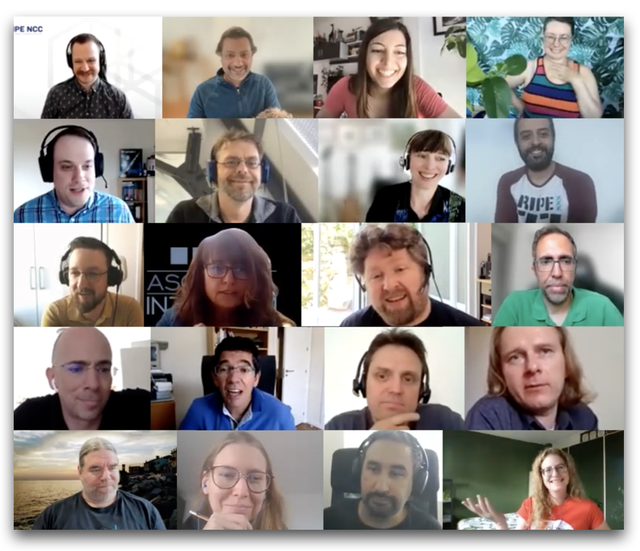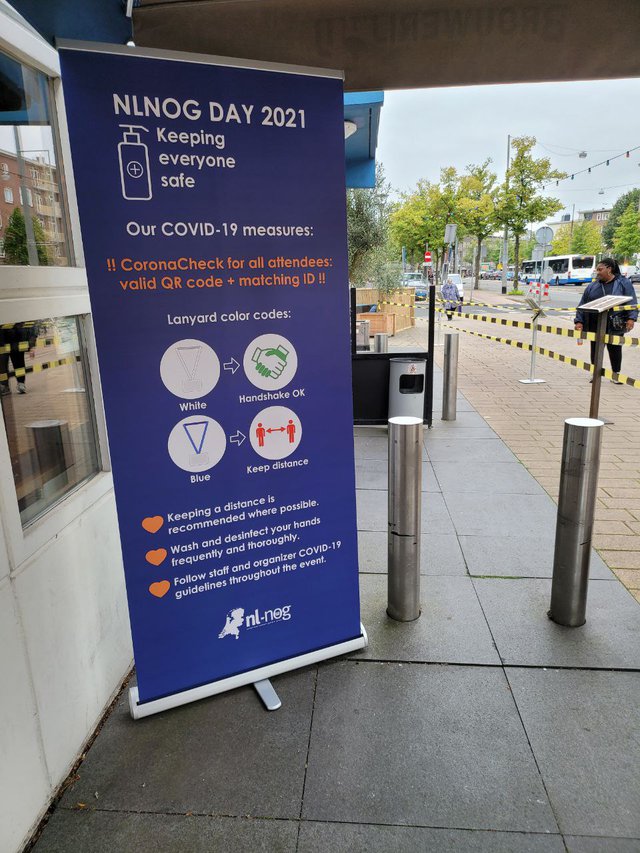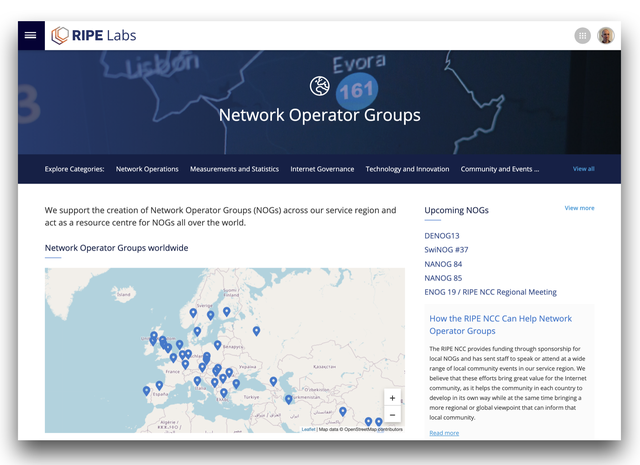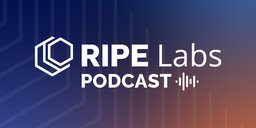The RIPE NCC recently held two Open House events to bring together people who help organise NOGs, which bring together people who help operate the Internet in particular parts the world.
Network Operator Groups (NOGs) are good for the Internet. They pull together network operators and other experts in specific regions to coordinate on issues affecting the Internet in that part of the world. Today there are many NOGs, each with its own character, and each with its own way of keeping its members connected.

That said, certain global events we're all pretty fed up of talking about have made the job of keeping NOGs active much more difficult. For this reason, the RIPE NCC recently invited NOG organisers to not one but two open house sessions to share how they've been getting on. The first session, attended by 36 people, took place in June, the second session, attended by 29, in October. Attendees - some of whom are pictured here - included NOG organisers, RIPE NCC staff, the RIPE Chair, and others. By my count, we got updates from representatives of just short of 20 NOGs.
Refreshingly, this wasn't just another conversation about COVID. Rather, the sessions got into questions about the purpose and resilience of NOGs, how they maintain cohesion, and how organisations like the RIPE NCC can keep lending support.
Each to Their Own
When we met in June, most if not all of us were under heavy travel restrictions -- again. More than a year into COVID, and with virtual meetings having lost their shine, some NOGs reported they were still experimenting with ways to keep things interesting online. Representatives for UKNOF and MENOG, for example, talked about trying to identify a kind of 'Goldilocks zone' for virtual events, tapping into the psychology of attendees to see what was and wasn't working for them. In true NOG style, this had involved exchanging ideas with others - going to other meetings, other NOGs, getting input, sharing tips, etc.
For others, waning attendance and the undeniable difficulty of capturing the 'feel' of in-person socials meant they'd either opted to keep virtual events simple - quick get togethers that serve the basic need of keeping in touch (ESNOG, GRNOG) - or abandon them altogether (INOG, RONOG, PTNOG).
In short, each NOG was doing its own thing. And that's how it should be. Part of what makes NOGs effective is that, although they're connected with each other and the wider community, their priority is to focus on their own local issues. Maintaining that local focus helped NOGs get on with things as global interaction got harder. As Nathalie Trenaman put it, for NLNOG, when the pandemic came, they just had to stop worrying about what was happening elsewhere and get on with their own mission.
Even locally, though, COVID has taken its toll on NOG people like it has on everyone else. The session touched on the impact of isolation and other lockdown-related maladies, tying in with earlier discussions about community resilience - e.g. at RIPE 82 and here on RIPE Labs. The agreed view was that the sooner physical meetings start up, the happier and healthier everyone will feel.
Back to Face to Face?
In June, we'd heard from some NOGs about a possible return to physical events. By October, it had already started happening. Remote hubs at ENOG 17 allowed attendees from across its (massive) region to gather in small numbers at select locations. Angela Stănescu told us about an in-person technical meeting RONOG held earlier in October. And following news at the June session that NLNOG Day 2021 would be a hybrid meeting, the event had since gone off live and in person in Amsterdam without a hitch, much to the enjoyment of all who took part. And we can expect more hybrid events to come.

That said, COVID is still making physical events harder to organise. As well as capacity limits at venues and the need to arrange checks for attendees, the situation has also changed peoples expectations about, and demand for, virtual interaction. For example, people who don't usually get to attend physical meetings are now used to being able to take part on the same footing as other attendees - and that should carry on. But balancing out the virtual and physical meeting experience alongside each other can be tricky, not to mention costly (more on this here).
NOGs will no doubt have to keep experimenting and learning from each other on this front. But, as everyone who has attended or organised one of these events said, the extra cost and effort is worth it! The opportunity for non-screen-fatigued, non-Internet-connection-dependent, non-living-room-or-kitchen-table-based interaction is a welcome change for the better.
Lines of Communication
Events are important, but they're not all there is to NOGs. Even NOGs built exclusively around social gatherings depend on good lines of communication to stay informed about what's coming up, or to chat about how, say, the latest Internet outage impacted a NOG's region. So a natural question that emerged at the October session was, how are NOGs keeping each other updated? How are they talking?
Again, different NOGs do different things, though many have gone through or are heading for some sort of change. So while Jan Žorž reported in that SINOG still relies exclusively on its mailing list, Denesh Bhabuta talked about how UKNOF made the move from IRC over to Mattermost. NLNOG are still busy on IRC, but are keen to move to something new. And we heard from Max Stucchi that while ITNOG see a lot of activity over Telegram, they also have a Discord server set up and ready to go. (There's more information in Alex Semenyaka's article on instant messengers for NOGs.)
So why all this change? For UKNOF, with their community growing to include new and younger members, the move was driven by the need to offer newcomers a platform they'd actually adopt. That's understandable, but then the challenge is to accommodate those new members without alienating older ones. The advice we heard from UKNOF was that just taking the leap had worked for them. Older NOG members had adapted.
Indeed, NOGs that don't adapt to new channels of communication run the risk of missing out. For instance, DisNOG - "the Network Operators' Group on Discord" - has over 2,800 general participants right now. 2,800+ people talking about network operations over a Discord server. Surely other NOGs should be taking part in that conversation.
NOG Support
The RIPE NCC has been providing support to NOGs for quite some time now, through sponsorship or by helping to organise and promote NOG events. On RIPE Labs, we have a page dedicated exclusively to NOGs where you'll find NOG-related articles, a list of upcoming NOG events, and a map of NOGs with links to their websites and further information.

While we were talking about channels of communication, my colleague Vesna Manojlovic had the good idea of adding to our current map of NOGs information pointing people to each NOG's main platform of communication. Putting this together would require work, but it's something we're looking into as we believe that having all this information gathered in one place would make it much easier for people in the wider technical community to reach out to their local NOGs and get involved.
We'll keep you updated on this and would welcome feedback in the comments below on whether this would be useful to you.
Summing Up
I haven't covered everything that came up at these sessions. There was talk about sharing social platforms for online meetings (e.g. Spatial chat and GatherTown), offers of help from the Global NOG Alliance (thanks Sander Steffann and Jan Žorž), and a call for more sessions like these in the future. You can always go and take a look at the full recordings (session 1, session 2) to get a clearer picture.
What I do hope to have got across is how NOG organisers have been working hard to keep NOGs working despite the pandemic. That work, bringing together local operators to focus on challenges peculiar to specific regions, remains hugely important to the wider community. All that remains is to thank not only the NOG organisers who came and talked to us, but NOG organisers all over the world for the time and effort they continue to give in making sure these important groups stay together!
And one very last thing - there are loads of NOG events coming up in the months ahead:
- DENOG13 (7-9 November)
- ESNOG (16 November)
- PACNOG 29 (19 November - 3 December)
- RSNOG (30 November)
- SwiNOG #37 (2 December)
Remember to keep checking the list on our NOGs page to stay updated on all upcoming NOG events!





Comments 1
Comments are disabled on articles published more than a year ago. If you'd like to inform us of any issues, please reach out to us via the contact form here.
Michael Oghia •
Thanks for this write-up Alun! I just joined the DisNOG – such a good idea. Also, if it's helpful to you and @Vesna, over the years I've worked to update the Wiki entry on NOGs: https://en.wikipedia.org/wiki/Internet_network_operators%27_group Maybe it'll be helpful as well! Lastly, one thing that could help is if there was a better understanding of which NOG corresponds to which place. Sometimes it's obvious like UKNOF, but not always.